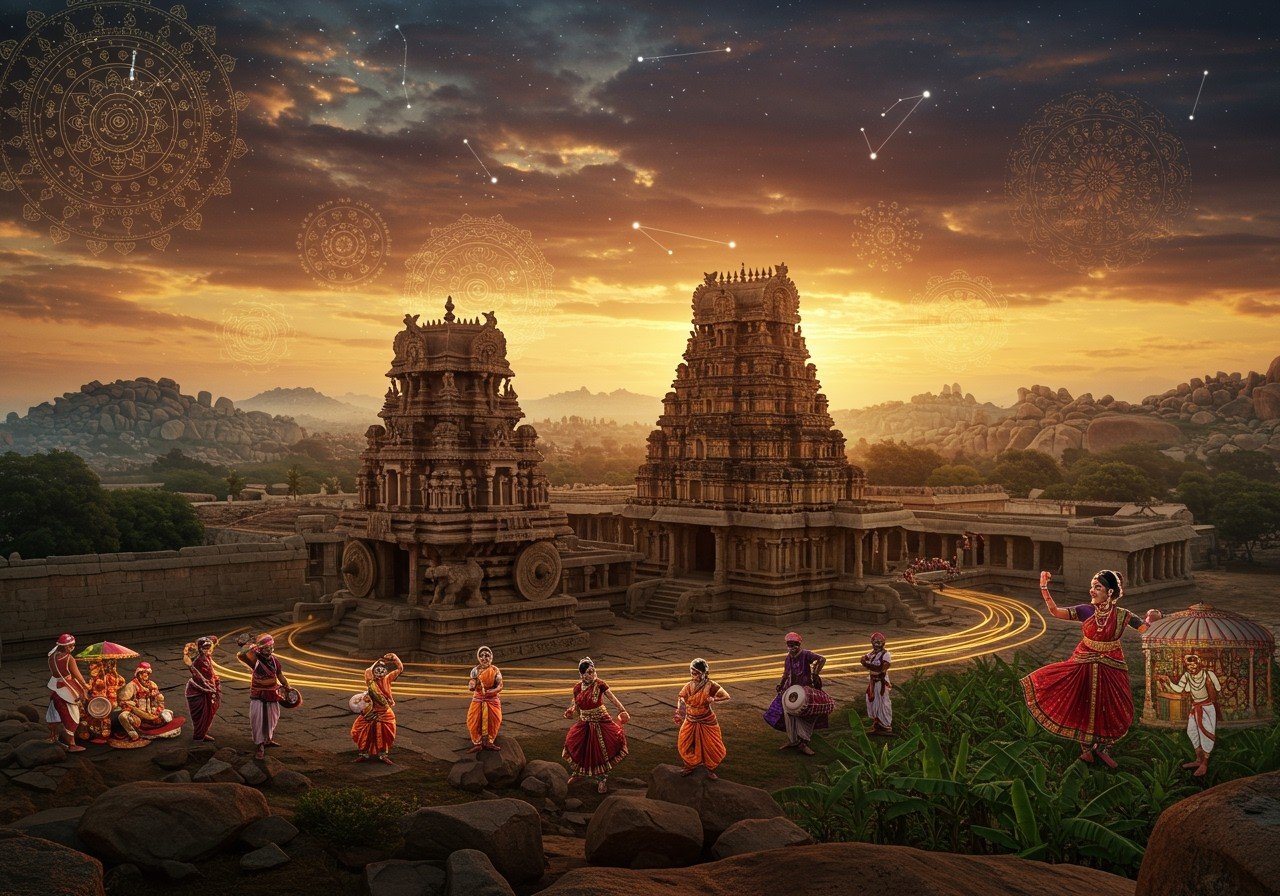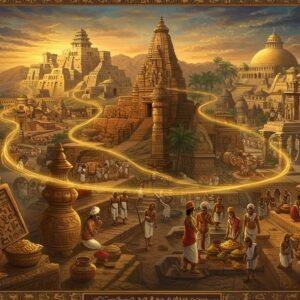
The Vijayanagara Empire, a powerful Hindu kingdom established in 1336 by Harihara I and Bukka Raya I, left an enduring legacy on South India. Flourishing between the 14th and 17th centuries, it filled a political void and significantly contributed to administration, culture, religion, art, and architecture. Renowned for its vibrant cultural life, including captivating art, unique architecture, rich literature, and lively dance, music, and festivals, the empire thrived under rulers like Harihara, Bukka, Dev Raya II, and Krishnadevaraya, who championed Hindu culture and defended against northern invasions. This article delves into the rich tapestry of Vijayanagara culture, exploring its literary achievements, intricate social structure, and efficient administration.
The Flourishing of Vijayanagara Literature
The Vijayanagara Empire was a hub of literary and artistic brilliance. A diverse body of literature thrived in Sanskrit, Telugu, Kannada, and Tamil, showcasing the empire’s intellectual prowess.
Royal Patronage and Literary Figures
Vijayanagara rulers, especially Krishnadevaraya, a renowned poet himself, generously patronized literature. This royal support nurtured the talents of prominent poets and scholars like Allasani Peddana, Nandi Timmana, and the witty Tenali Ramakrishna.
Themes and Debates
Vijayanagara literature explored themes of devotion, bravery, and moral values, often drawing inspiration from religious and philosophical thought. Lively literary debates and discussions flourished in the royal courts, fostering intellectual exchange.
Literary Gems and Preservation
Significant works like Krishnadevaraya’s ‘Amuktamalyada’ and Allasani Peddana’s ‘Manucharitam’ exemplify the literary richness of the era. These literary treasures were carefully preserved through meticulous manuscript copying and the vibrant oral tradition.
The Complex Social Fabric of Vijayanagara
Vijayanagara society was a complex and well-organized structure with distinct social hierarchies and roles, reflecting the influence of Hindu traditions.
Social Classes and Roles
The social hierarchy comprised Brahmins, Kshatriyas, Vaishyas, and Shudras, each with specific roles and responsibilities. This structured system contributed to the social and economic stability of the empire. The roles were often hereditary, contributing to social stability and continuity.
Women, Family, and Temples
Women held influential positions in Vijayanagara society, with figures like Gangadevi exemplifying their contributions. The prevalence of joint family systems strengthened social cohesion. Temples served as vital centers of social and cultural activity, fostering community bonds and religious observance.
Contributions of Artisans and Traders
Skilled artisans and traders played a crucial role in the empire’s economic prosperity, contributing to its vibrant marketplaces and trade networks. Their craftsmanship and entrepreneurial spirit enriched the empire’s material culture.
The Efficient Administration of the Vijayanagara Empire
The Vijayanagara Empire’s administrative system, a key factor in its longevity and success, was remarkably efficient and well-structured.
Hierarchical Structure and Provincial Governance
A clear hierarchical structure, from the emperor to local chiefs, ensured smooth governance. The empire, divided into provinces called Nadus, was administered by appointed officials who implemented the emperor’s directives, ensuring effective regional control. This hierarchical structure facilitated effective communication and control across the vast empire.
The Royal Court, Military, and Economic Policies
The royal court, the center of decision-making, shaped policies and maintained order. A strong military, essential for stability, protected the empire and facilitated expansion. Well-defined economic policies, including a sophisticated land revenue system and trade regulations, fueled economic growth. These policies encouraged both internal and external trade, contributing to the empire’s wealth.
Public Works, Infrastructure, and Judicial System
The Vijayanagara Empire prioritized public works, investing in irrigation systems, road networks, and other infrastructure projects that enhanced the lives of its citizens. These projects not only improved the quality of life but also stimulated economic activity. A robust judicial system, based on principles of law and justice, ensured fairness and order throughout the empire, upholding its integrity. This system provided a framework for resolving disputes and maintaining social harmony.
Poojn.in: Connecting You to Vijayanagara’s Sacred Heritage
Poojn.in, India’s leading cultural goods and services store, offers a wide selection of products that connect you with the spiritual traditions of the Vijayanagara Empire. We provide authentic puja items and religious artifacts related to the empire’s main deities – Vishnu, Shiva, and Krishna – allowing you to continue these sacred practices today.
- For Vishnu devotees: Brass Laddu Gopal Murti, Brass Radha Krishna Murti, traditional Vishnu puja sets, and Garuda-themed items.
- For Shiva worshippers: Sacred Shiva lingams crafted from various materials, complete Shiva abhishekam sets, Rudraksha malas, and sacred ash. We offer a range of sizes and materials to suit individual preferences and devotional practices.
- For Krishna bhakti: Exquisitely handcrafted Krishna idols, flutes and other Krishna worship items, and special Tulsi malas for dedicated devotion. Our collection celebrates the many facets of Krishna’s divine personality.
We also offer items related to other significant Vijayanagara deities, including Brahma, Indra, and temple-grade oil lamps and diyas. Each product is accompanied by detailed information on its ritual significance and proper usage, verified by religious experts. Visit www.poojn.in to explore our full collection and connect with this rich cultural heritage.
Conclusion
The Vijayanagara Empire’s legacy continues to inspire and influence contemporary Indian society. Its remarkable achievements in administration, literature, and social organization stand as a testament to a glorious era. By exploring Vijayanagara’s rich culture, we gain a deeper understanding of India’s vibrant past and the enduring values that shaped it.
Andhra Pradesh Coastal Temples


